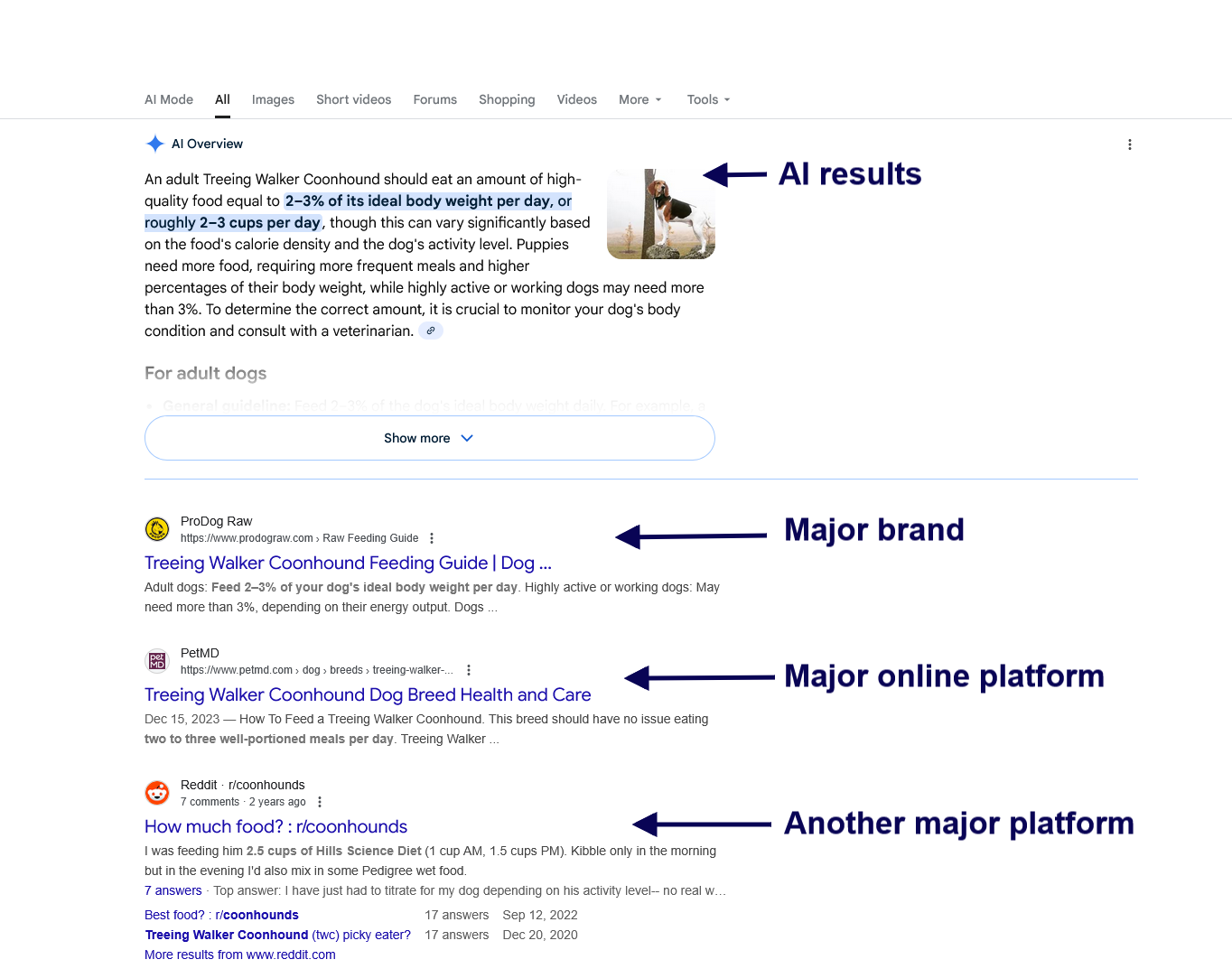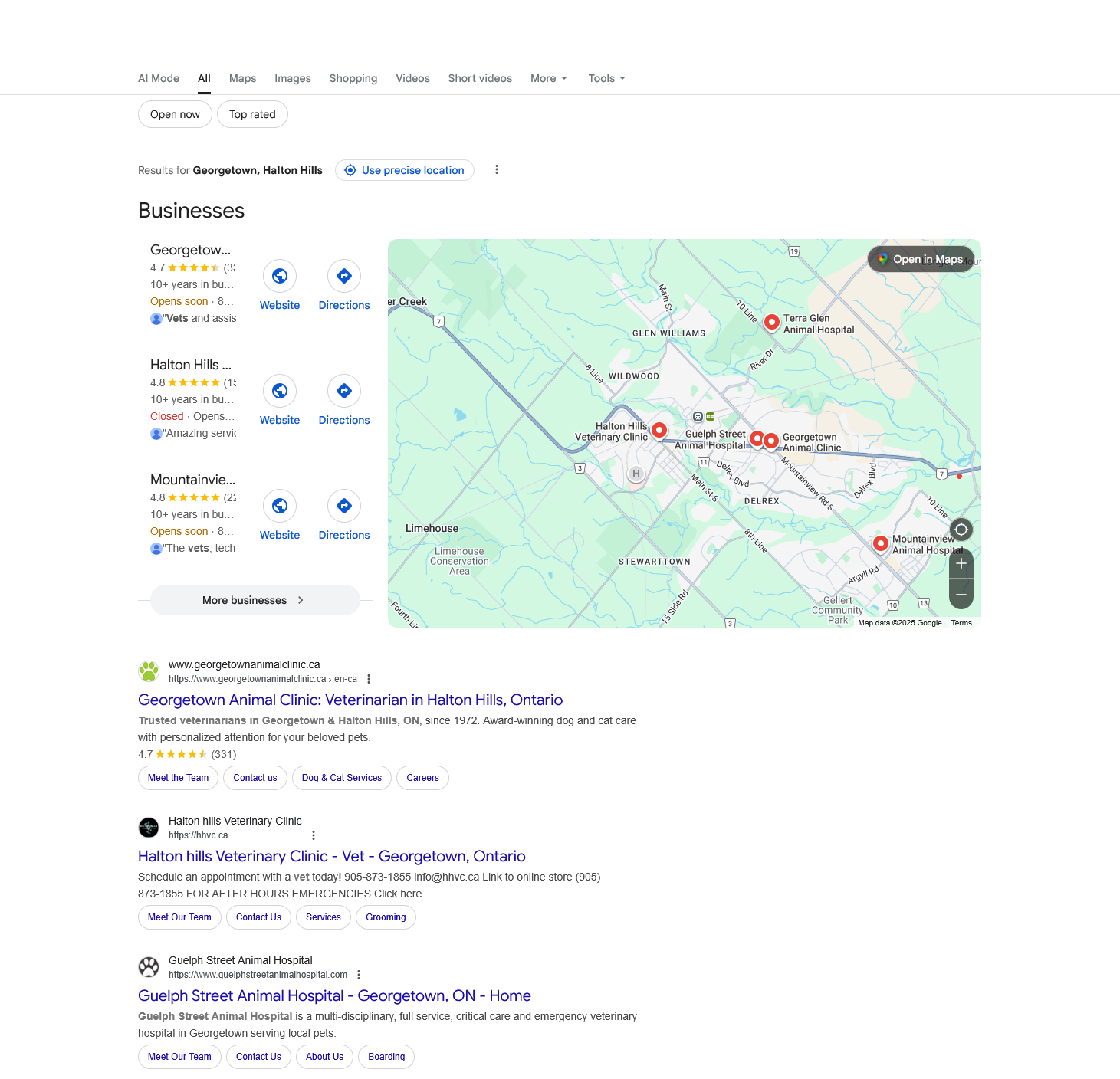Have You Noticed a Decline in Business? If your answer is “Yes,” you’re not alone. Over the past six months, many companies have experienced quieter phones, a shrinking sales pipeline, and stalled projects. While the economy certainly plays a role, there’s more happening behind the scenes, especially in how people find and interact with businesses online.
How AI is changing search results
Artificial Intelligence is reshaping not only how search results are displayed, but also how people search.
Here’s a quick example. Last month, in an effort to save our dog from my husband’s overfeeding habits, I searched for “how much should a Treeing Walker Coonhound weigh?”
In the past, I would have expected to see links to veterinary websites, blog articles, or weight charts. This time, however, the first thing I noticed was an AI-generated answer, followed by results from major brands, discussion forums, and social media platforms. Links to dog food brands and vet blogs were buried much further down.

However, when I searched for “veterinary clinic in Georgetown,” I got the traditional Google results – local business listings and a map, with a few paid ads at the top.

AI suggestions appear first for many search queries
If you’ve played the SEO game, the rules have changed. But don’t worry, it still makes sense once you understand what’s happening.
AI tends to deliver informational results, answers to queries that start with What is…, How to…, Where can I find…, or What makes….
Google’s traditional search results, on the other hand, focus more on keyword-specific queries, such as “veterinary clinic near me” or “veterinary clinic in Georgetown.” In those cases, Google Business listings and the map view still dominate.
Most websites have two main types of content:
Core Content
These are your main pages: Home, Services, Programs, About Us, and Contact.
Core content tells the world who you are, what you do, where you operate, and how to contact you.
To perform well, these pages should:
- Include relevant keywords in the title (H1) and subheadings (H2, H3)
- Use keywords naturally throughout the text
- Have a meta description and schema markup for better search visibility
Dynamic Content (Blog, News, Case Studies)
Dynamic content showcases your expertise and keeps your website fresh. Blog posts offer advice, insights, and updates, proving your business is active and knowledgeable.
Blogging has long been a pillar of SEO, but keeping up with it can be challenging. It takes time, writing skill, and consistency. (And for those of us writing in English as a second language—thank goodness for Grammarly!)
Each blog post should:
- Focus on a single topic
- Include keywords in the title, headings, and meta description
- Be structured for readability and SEO
Why? Because that’s how your content gets picked up for “What is…” or “How to…” type searches that AI now prioritizes.
Pro Tip:
Commit to creating content regularly. Whether it’s a written blog, video blog, or podcast.
Then, share it strategically:
- On social media platforms that make sense for your business
- In a regular email newsletter to your customers and prospects
Getting your website back on track
To improve your visibility, start by understanding where you stand. Ask yourself:
- How do I currently rank in search results (both AI and traditional)?
- Who is ranking ahead of me and why?
- What keywords do they use?
A comprehensive SEO report can answer these questions and more. It will show you:
- Where your website stands in both AI and Google search results
- What keywords your audience is actually searching for
- How difficult it is to rank for those keywords
- Your site’s overall health – speed, structure, markup
- Which pages and content types to prioritize
- How to optimize your Google Business profile and social media presence
In short, a professional SEO report removes the guesswork.
The Bottom Line
Once we figured out exactly what our dog needed to eat, the weight problem got on the right track (at least for now!). Similarly, once you understand which keywords matter and optimize your website accordingly, your search rankings can bounce back and so can your business. We’ve guided other companies through this and can help you too. Send us a link to your website and let’s chat.

